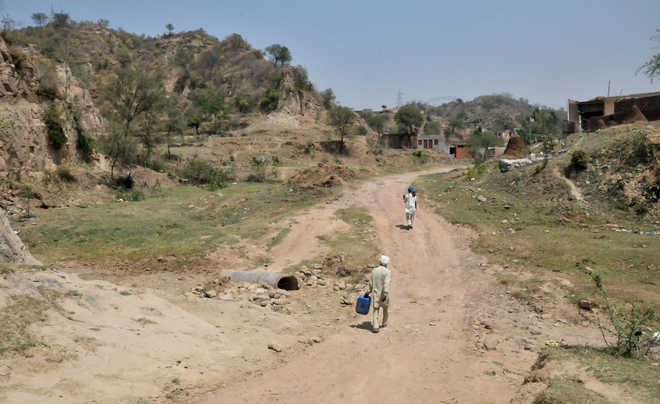Saurabh Malik
Tribune News Service
Chandigarh, August 4
Masol village in Mohali district is about 20 km away from Chandigarh, but when it comes to amenities, the hamlet appears to be ages away. Indication to this effect came during the hearing of a petition before the Punjab and Haryana High Court.
As a case involving the issue of empowering women came up for resumed hearing, senior advocate Reeta Kohli, appointed amicus curiae or the friend of the court, told the Bench of Justice Ritu Bahri that even roads, good schools and other amenities were not available for residents of the village.
Taking a stern view, Justice Bahri directed a visit to the village by the authorities concerned before the submission of a detailed report. Justice Bahri, in fact, directed “all officers present in court will visit the village”.
Masol had hit the headlines a year ago after excavations by the Archeaological Survey of India had revealed large-size fossils of animals and even human beings. Apart from Indian archaeologists, a team of French scientists too had reportedly carried out an excavation and research in the village. Indications are that the fossils are 2.5 million years old.
The development took place soon after Justice Ritu Bahri initiated suo motu proceedings for preventing women from ending their lives and benefiting them at pre-crime stage.
The High Court had earlier finalised three villages in Punjab, Haryana and Chandigarh for the implementation of the scheme for turning them into model hamlets to empower women.
Justice Bahri had asserted that the villages could be taken as a sample for implementing MGNREGA scheme, whereby women could be employed for the purpose of creating
infrastructure for hygienic kitchen, besides beautification and cleaning of the villages. NGOs could also be associated for helping in the installation of solar lights and bio-gas plants in the villages. The students from architecture colleges too could be associated for giving suggestions to beautify the areas.
Justice Bahri had also recommended an increase in plantation by associating village panchayats and other villagers to overcome environmental threats. “Suggestions could be given as to how women living in the villages could be motivated to produce healthy food, handicrafts, etc. which could be sold in cities with the help of social media and other means.
“College students could be motivated to share their books, toys, clothes, etc. with children of the villages to increase happiness and peace among women and children of weaker sections,” Justice Bahri had added.
Unlock Exclusive Insights with The Tribune Premium
Take your experience further with Premium access.
Thought-provoking Opinions, Expert Analysis, In-depth Insights and other Member Only Benefits
Already a Member? Sign In Now










